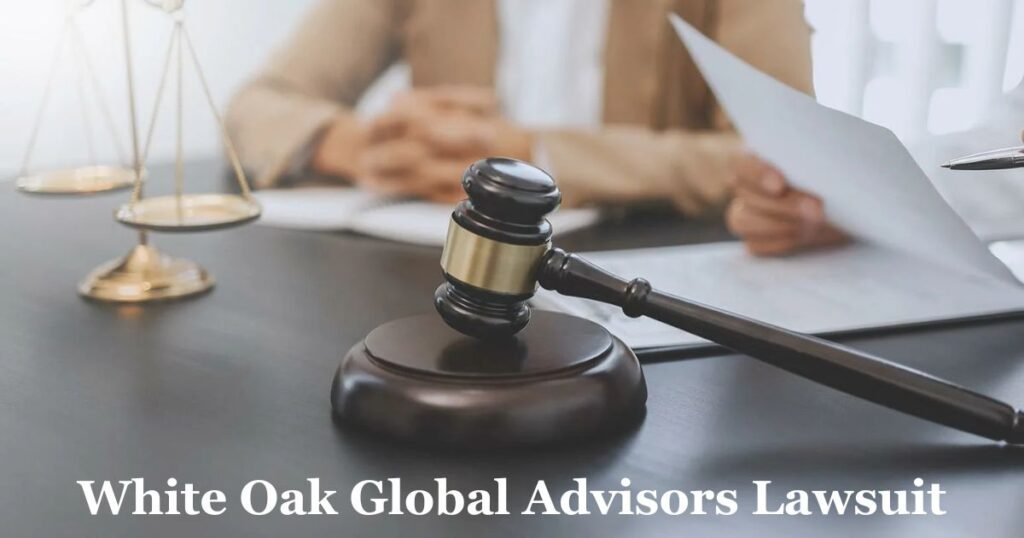White Oak Global Advisors lawsuit, a prominent private credit firm specializing in lending to middle-market companies, has faced multiple legal challenges in recent years. With billions under management and a reputation for providing financial solutions to businesses that may not have access to traditional funding sources, White Oak has gained attention for both its successes and its controversies. Among these are the lawsuits that have arisen, casting a shadow on the firm’s reputation.
In this blog post, we will explore the key details behind the White Oak Global Advisors lawsuit, its legal implications, and what this means for the broader financial landscape.
Table of Contents
- Introduction to White Oak Global Advisors
- Background of the Lawsuit
- Key Allegations Against White Oak Global Advisors
- White Oak’s Defense
- Impact on Investors and Clients
- The Financial Industry’s Response
- What This Lawsuit Means for Private Lending
- Lessons for Other Private Credit Firms
- Future Outlook for White Oak Global Advisors
- Conclusion
1. Introduction to White Oak Global Advisors
Founded in 2007, White Oak Global Advisors is a San Francisco-based private credit investment firm. Known for offering alternative lending solutions, the firm focuses on providing debt financing to companies in need of capital, particularly those that may not meet the criteria for traditional bank loans. White Oak has established itself as a key player in the private lending sector, with a portfolio that spans multiple industries, including healthcare, manufacturing, and technology.
Despite its track record of managing successful deals, the firm has recently been embroiled in a lawsuit that could potentially affect its standing in the industry.
2. Background of the Lawsuit
The lawsuit involving White Oak Global Advisors has been a subject of discussion within financial circles due to the high-profile nature of the firm. The specifics of the legal dispute vary depending on the parties involved, but a common theme is related to allegations of misconduct, breach of contract, or financial mismanagement in relation to certain lending or investment practices.
In one case, White Oak was accused of engaging in practices that allegedly harmed its clients and investors. The details of these claims often revolve around improper handling of loan portfolios, misleading statements to investors, and failure to adhere to fiduciary responsibilities.
3. Key Allegations Against White Oak Global Advisors
The allegations in the White Oak Global Advisors lawsuit can be summarized as follows:
- Breach of Fiduciary Duty: White Oak has been accused of failing to act in the best interests of its investors, leading to financial losses.
- Mismanagement of Assets: There have been claims that White Oak improperly managed loan portfolios, resulting in significant financial risk for its clients.
- Failure to Disclose Risks: Investors have alleged that White Oak did not fully disclose the risks associated with certain investments or loan structures, which may have led to unexpected losses.
- Misrepresentation of Financial Health: Some lawsuits allege that White Oak presented a misleading picture of its financial health or the potential returns on investments, encouraging investors to participate under false pretenses.
These claims are serious and could have significant legal ramifications if proven true.
4. White Oak’s Defense
In response to these allegations, White Oak Global Advisors has consistently denied any wrongdoing. The firm maintains that it has acted in accordance with industry standards and within the legal framework governing private credit firms. White Oak argues that any losses suffered by investors or clients were the result of market conditions or unforeseen events, not any malfeasance on its part.
Moreover, White Oak’s legal team has emphasized that the firm has a strong compliance program in place, designed to ensure that all transactions and investments are conducted ethically and transparently. They claim that the lawsuits are without merit and intend to fight the allegations in court.
5. Impact on Investors and Clients
The lawsuits have understandably caused concern among White Oak’s investors and clients. Legal disputes of this nature can create uncertainty, particularly for investors who rely on White Oak’s expertise to manage their assets responsibly.
In some cases, investors may choose to withdraw their capital or reduce their exposure to White Oak due to the uncertainty created by the lawsuit. Additionally, any negative outcome in court could result in financial penalties for the firm, further affecting its ability to operate as a leading player in the private lending space.
On the other hand, some investors may choose to wait and see how the lawsuit plays out, trusting that White Oak will be vindicated and that the firm’s financial strength will remain intact.
6. The Financial Industry’s Response
The legal challenges facing White Oak Global Advisors have sparked discussions within the financial industry about the broader implications for private credit firms. As more companies turn to alternative lending in the wake of tightening regulations on traditional banks, the private credit sector is under increasing scrutiny.
Some financial experts believe that the lawsuit against White Oak could lead to increased regulatory oversight of private credit firms. Others argue that this case highlights the need for more transparency and investor protection in the industry, particularly when it comes to high-risk lending practices.
7. What This Lawsuit Means for Private Lending
The White Oak Global Advisors lawsuit raises important questions about the role of private lending in today’s financial markets. As private credit firms play an increasingly important role in providing capital to businesses, it is essential that they operate with transparency and integrity.
This lawsuit could serve as a wake-up call for the private lending sector, pushing firms to reassess their compliance programs and ensure that they are adhering to best practices. Additionally, it may prompt regulatory bodies to take a closer look at how private lenders operate, potentially leading to new guidelines or rules to protect investors.
8. Lessons for Other Private Credit Firms
For other private credit firms, the White Oak lawsuit offers valuable lessons. Maintaining transparency, clear communication with investors, and adherence to fiduciary responsibilities are crucial to avoiding similar legal issues. Private lenders should also invest in robust compliance programs to ensure that they are operating within the bounds of the law and ethical guidelines.
By learning from White Oak’s situation, other firms can work to build trust with investors and clients, safeguarding their reputations in an increasingly competitive market.
9. Future Outlook for White Oak Global Advisors
Despite the current legal challenges, White Oak Global Advisors remains a significant player in the private credit industry. The outcome of the lawsuit will play a large role in determining the firm’s future. If White Oak is able to successfully defend itself against the allegations, it may emerge stronger and more resilient. However, a negative outcome could result in financial penalties, reputational damage, and loss of investor confidence.
Regardless of the lawsuit’s result, White Oak will need to take steps to reassure its investors and clients, demonstrating its commitment to ethical and responsible investing.
10. Conclusion
The White Oak Global Advisors lawsuit serves as a stark reminder of the complexities and risks involved in the private credit sector. While White Oak continues to deny any wrongdoing, the outcome of this legal dispute will likely have far-reaching implications for both the firm and the industry as a whole.
For investors, the case underscores the importance of due diligence and understanding the risks associated with alternative lending. For private credit firms, it highlights the need for transparency, strong compliance practices, and ethical responsibility to maintain trust in the ever-evolving financial landscape.
As the lawsuit unfolds, the financial world will be watching closely to see how White Oak responds and what lessons can be learned from this high-profile case.







